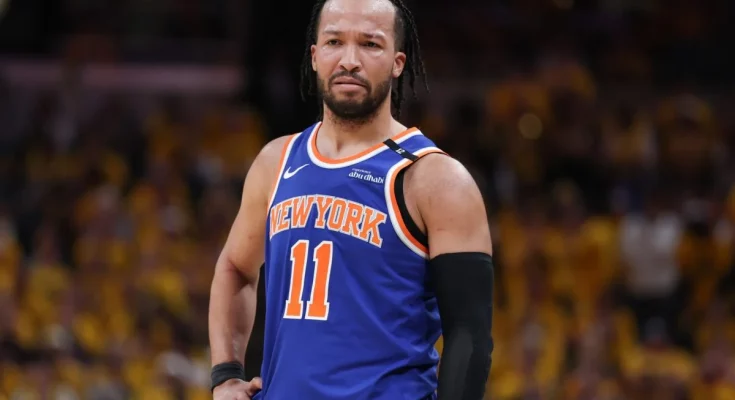As the NBA free agency period rolls into Day 3, the New York Knicks are beginning to show a clearer picture of their strategy moving forward, following their recent signings of Jordan Clarkson and Guerschon Yabusele. These moves provide valuable insights into the team’s direction, roster construction, and the front office’s priorities as they look to improve their competitiveness in the upcoming season. The acquisitions of Clarkson and Yabusele mark important steps for the Knicks, but they also raise several questions about how the team plans to build around their existing core and what the next moves might entail.
To understand what’s next for the Knicks, it’s essential to first analyze what these signings bring to the team and what they reveal about the franchise’s approach to free agency. Jordan Clarkson, known for his scoring punch and ability to come off the bench with instant offense, is a dynamic guard who offers the Knicks a proven weapon. His career trajectory has been marked by steady production and a knack for making an impact in limited minutes, particularly with his scoring efficiency and quick scoring bursts. Clarkson is not just a scorer; his ability to create shots off the dribble and contribute in transition gives the Knicks added versatility in their backcourt rotation. This signing suggests the Knicks are keen to deepen their guard rotation, which has often been a point of vulnerability.
Guerschon Yabusele, on the other hand, adds a different kind of depth to the roster. He is a forward who brings size, athleticism, and a growing skill set that includes scoring ability both inside and from mid-range, along with rebounding. Yabusele’s signing reflects a strategic emphasis on adding versatile frontcourt players who can stretch the floor and provide energy. His ability to switch defensively and contribute in multiple facets of the game fits well with the modern NBA’s demand for players who can fill multiple roles. Yabusele’s presence could also signify that the Knicks are looking to bolster their bench depth on the wings, an area that has seen inconsistency in previous seasons.
Taken together, these signings demonstrate the Knicks’ intent to build a more balanced and versatile roster capable of sustained performance throughout the season. With these two additions, the Knicks now have a more complete supporting cast around their established stars. But what does this mean for the Knicks’ bigger picture, especially in terms of their playoff aspirations and roster flexibility?
One of the biggest questions heading into Day 3 of free agency is how the Knicks plan to manage their cap space and potential future moves. The team has been careful to maintain some financial flexibility after these signings, suggesting that they are still actively exploring opportunities to upgrade their roster. The front office, led by team president Leon Rose and general manager Scott Perry, has been clear about their commitment to assembling a competitive team without jeopardizing future flexibility. This could mean the Knicks remain in the market for either a high-impact veteran or a promising young player via trade or remaining free agency options.
The recent signings also shed light on the Knicks’ commitment to developing their young core. Players like RJ Barrett, Obi Toppin, and Immanuel Quickley form the foundation for the team’s future, and the additions of Clarkson and Yabusele aim to provide them with experienced, complementary pieces. The hope is that these veterans can not only contribute on the court but also mentor the younger players, helping them develop into more consistent contributors. The Knicks’ emphasis on adding players who bring energy and professionalism signals a culture-building effort designed to create a winning atmosphere.
Defense remains a critical area for the Knicks to improve. While both Clarkson and Yabusele bring certain defensive capabilities, the Knicks will likely continue to look for ways to strengthen their defensive schemes. Defense has been a cornerstone for the team’s previous successes, especially during their playoff runs, and maintaining that identity will be key. The presence of defensive-minded coaches and the front office’s willingness to prioritize defense in their roster decisions show that the Knicks are not ready to compromise on this aspect of their game.
Another area of focus will be the Knicks’ shooting consistency. Both signings contribute shooting, with Clarkson’s ability to hit three-pointers and Yabusele’s mid-range game helping to stretch defenses. However, the Knicks will need to ensure they have enough reliable shooters to space the floor effectively for their primary playmakers. This will be particularly important for players like Jalen Brunson and Barrett, who rely on space to operate efficiently. It’s reasonable to expect that the Knicks might continue to seek shooting specialists either via trade or the remaining free agency pool.
The Knicks also have to consider their bench rotation and how to balance minutes among the growing roster. With the additions of Clarkson and Yabusele, the team’s depth improves significantly, but managing playing time and chemistry will be crucial. Coach Tom Thibodeau is known for his demanding approach and preference for defensive toughness, so integrating new players while maintaining the team’s identity will require careful handling. The players’ adaptability to the coach’s system and their ability to perform within defined roles will be vital factors in the Knicks’ success.
Looking beyond the immediate signings, there are broader strategic questions about the Knicks’ positioning in the Eastern Conference. The conference has become increasingly competitive, with many teams investing heavily in star talent and supporting casts. The Knicks’ moves so far indicate a desire to remain relevant and push deeper into the playoffs. However, whether the current roster is equipped to challenge the top-tier teams remains to be seen. The front office will have to balance patience with ambition as they decide if they want to make bold trades or continue to build incrementally through free agency and player development.
One interesting aspect of the Knicks’ strategy is their focus on players with proven experience and versatility rather than chasing marquee names in free agency. This approach could reflect lessons learned from previous years, where signing big-name free agents did not always translate into sustained success. By signing players like Clarkson and Yabusele, the Knicks are opting for steady, reliable contributors who fit specific roles and team needs. This method may not generate headline-grabbing signings, but it could yield a more cohesive and balanced team in the long run.
Moreover, the Knicks’ moves reflect a growing trend in the NBA to value players who can fill multiple roles and bring intangible qualities such as leadership and work ethic. Clarkson’s energy and scoring off the bench have made him a fan favorite in his previous stops, and Yabusele’s athleticism and hustle provide a spark. These qualities align with what the Knicks want to build around—a team that plays hard, defends well, and competes every night.
Looking ahead, the Knicks will likely continue to monitor the market closely, especially with the trade deadline and potential roster adjustments looming. There is still room for maneuvering, and the front office will be evaluating options to improve the team further. Whether that comes through targeted trades, the waiver wire, or minor free agency pickups, the Knicks are positioned to be active participants as the season unfolds.
It’s also worth considering the impact of these signings on the Knicks’ team culture and fan engagement. New York is a passionate basketball market, and fans are eager to see the team return to its glory days. By adding players like Clarkson and Yabusele, who are known for their work ethic and team-first attitude, the Knicks are sending a message about their commitment to building a sustainable and competitive team. These players can help bridge the gap between the established stars and the younger players, fostering a sense of unity and shared purpose.
Financially, the Knicks appear to have managed their salary cap prudently with these deals, which allows them to remain flexible for future roster enhancements. This fiscal responsibility is important given the uncertainties in the NBA landscape and the need to maintain the ability to pursue potential midseason acquisitions. The Knicks’ front office has shown a willingness to be patient and deliberate, which may pay dividends as they navigate the complex free agency and trade markets.
In terms of the overall roster, the Knicks are shaping a team that balances youth and experience, offense and defense, and size and skill. Clarkson and Yabusele complement existing pieces and fill gaps that were exposed in the prior season. The Knicks have shown they value players who can contribute immediately and adapt to the team’s needs, which bodes well for their chances to compete at a higher level.
The key challenges for the Knicks moving forward will be integrating these new players into the team’s system and maintaining consistency throughout the season. Injuries, chemistry, and adapting to the coach’s philosophy will all play significant roles in determining the team’s success. The front office and coaching staff will need to remain agile, making adjustments as necessary to optimize performance.
Another factor to watch will be how these signings influence the Knicks’ draft and player development strategies. With a deeper bench and more veteran presence, the Knicks may have more flexibility to develop younger players at a more measured pace. This could enhance the team’s long-term prospects while still pushing for immediate success. Balancing the desire to win now with the need to build for the future is a delicate task that the Knicks appear to be navigating carefully.
From a competitive standpoint, the Knicks’ moves position them as a solid playoff contender in the Eastern Conference, but not yet a clear favorite. They have improved their depth and added valuable role players, which should translate into a more resilient team. However, to challenge for a championship, the Knicks will likely need to continue adding star talent or discover breakout performances from their young core.
The signings of Clarkson and Yabusele also highlight the importance of role players in today’s NBA. Championships are often won by teams that have strong supporting casts, and the Knicks are signaling their understanding of this reality. By assembling a roster with complementary players who can fill specific niches, the Knicks increase their chances of success in the highly competitive postseason environment.
In conclusion, as Day 3 of NBA free agency unfolds, the New York Knicks have taken meaningful steps with the signings of Jordan Clarkson and Guerschon Yabusele. These moves provide depth, versatility, and experience, all of which are critical for the team’s goals. The Knicks have maintained financial flexibility, signaling potential further activity in the market. They have reinforced their commitment to a balanced roster that supports their young core while staying competitive. Moving forward, the Knicks will need to focus on integration, chemistry, and possibly adding more pieces to solidify their standing as playoff contenders. The front office’s patient and pragmatic approach suggests they are building a foundation not just for short-term success but for sustained competitiveness in the seasons ahead. Fans and analysts alike will be watching closely to see how the Knicks navigate the remainder of free agency and beyond, as the team aims to reclaim its place among the NBA’s elite.



